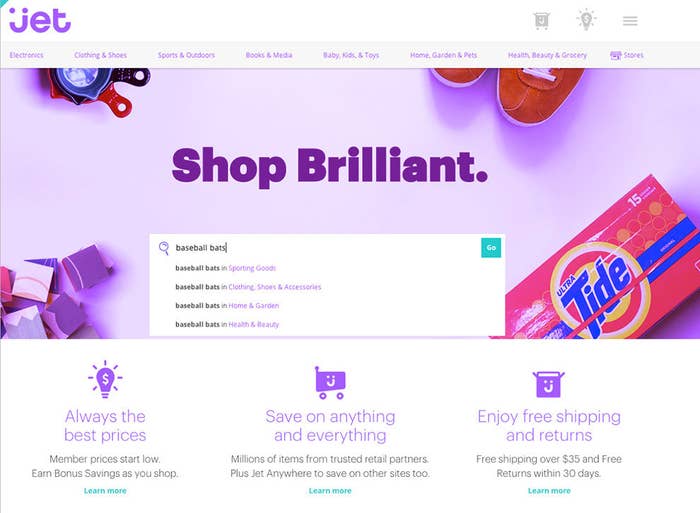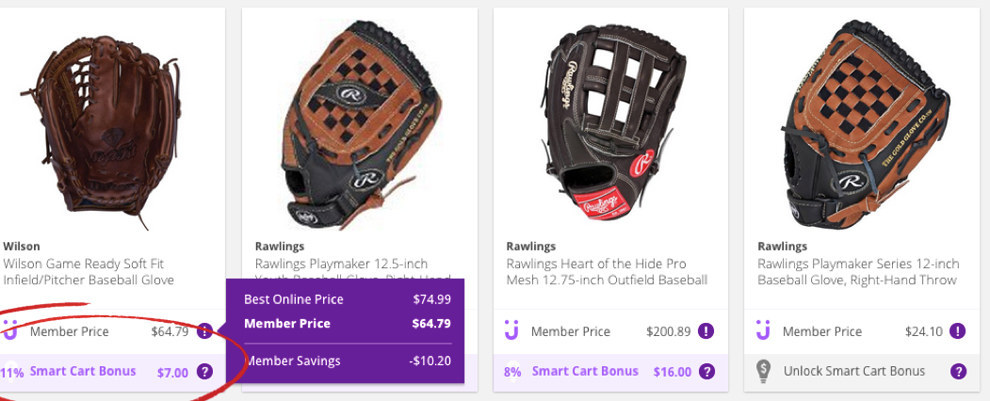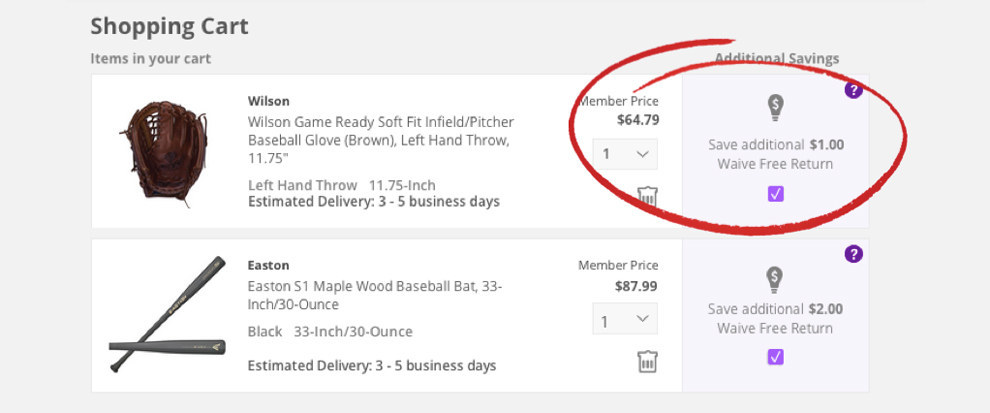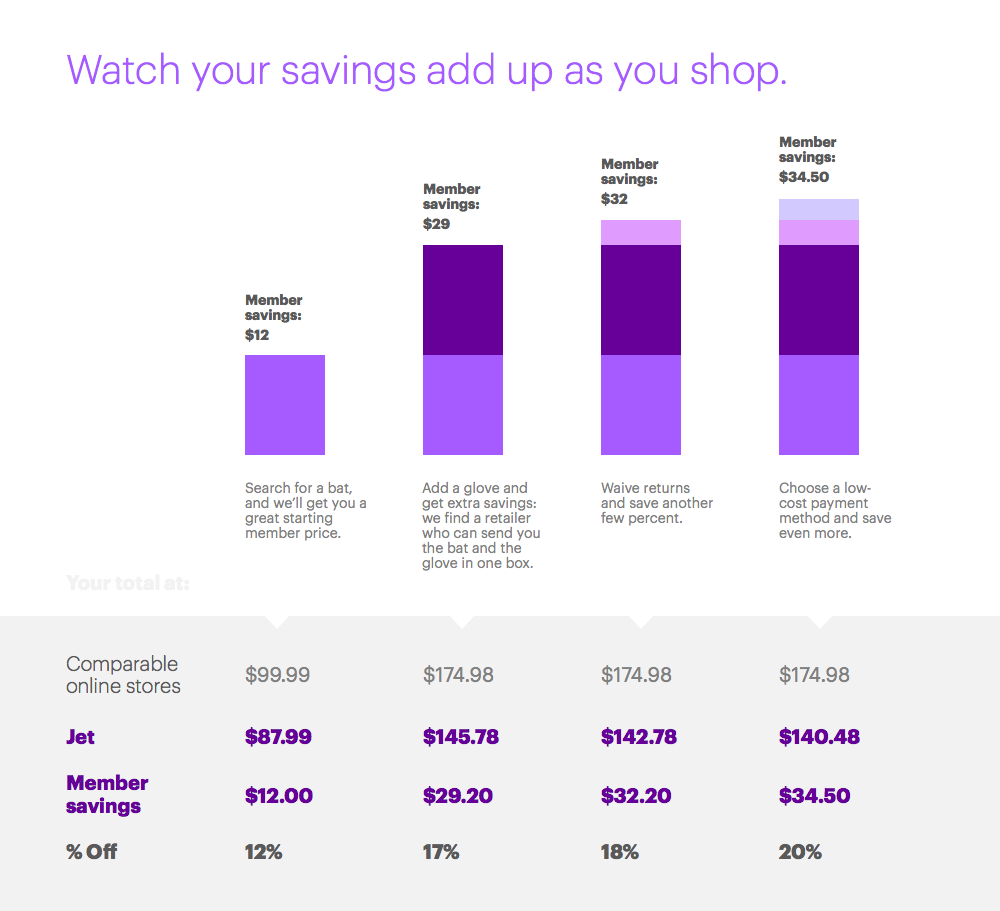
Since July of last year, entrepreneur Marc Lore has been posting coy updates to his Tumblr about Jet.com, a mysterious "new shopping experience" that would "empower customers like never before."
Speculation around the secretive project surged as Lore, who sold Diapers.com to Amazon for $550 million five years ago, raised a whopping $80 million in venture capital. He managed to hire more than 100 employees, sign a lease on a 40,000-square-foot headquarters in Hoboken — and still, hardly a hint.
Lore finally unveiled Jet.com this month, and it is, as promised, a unique proposition in online retailing. It's a $50-a-year, members-only online marketplace that promises to save customers 10% to 15% on everything they buy online. It doesn't matter where else you can find it — Amazon included — Jet guarantees a lower price.
How do you sell everything cheaper than everyone else does and still make money? Jet says it plans to make money only off membership fees, and will squeeze out every last cent of savings by identifying all the inefficiencies built into the online shopping system. The company claims it will teach customers how they can save hundreds of dollars in the course of a year by making small changes in how they shop online: tweaking shipping speed, return policies, and payment methods on purchases, all of which Lore says have baked costly inefficiencies into the system today.
In today's world, you typically don't know whether the stuff you order online is coming from one mile away or 1,000 miles away — and you don't really care. After all, prices don't fluctuate based on how much you're buying, or where your items are getting shipped from. Jet's technology is unique in that it drills down into those areas to identify where consumers can save, in real time.
A search for a baseball glove might return dozens of items, including some that come with a discount because they're being shipped from somewhere close to you. Are you OK with waiting a few days for a shipment? That could knock a few more dollars off the price. The same goes for waiving returns, because maybe you're buying a product you've already purchased before. And so on.
Jet says that by taking all these elements into account, it can guarantee the lowest price on the web, every time. That is, even lower than Amazon.
But trying to beat Amazon on price won't be easy. The e-commerce behemoth is famous for ruthlessly slashing prices to undercut rivals, happily accepting razor-thin profit margins and even losses, to win market share. Amazon's shareholders have shown supreme patience for such behavior, enabling the company's aggressiveness, and helping it maintain its status as the cheapest spot on the web. Lore knows his goal of offering the web's lowest prices will be a challenge — Diapers.com was a victim of Amazon's insane price-war behavior before selling itself to the company. Amazon was reportedly ready to lose $100 million in three months on diapers just to undercut Lore's business. The same could happen this time around.
"If Amazon makes a concerted effort to crush them, I could see that being a fatal blow before they really get off the ground," said Yory Wurmser, an analyst at eMarketer. "I don't think Amazon is going to do that initially because they would have to lower their prices across the board, losing huge amounts of money to compete against a startup before it's really taken off, and they're not going to do that. If they do it, they'll do it once it gathers some steam."
Jet will operate three of its own warehouses for selling big-brand consumables like toilet paper, diapers, and dog food. But the rest of the goods will come from all over: The site will work as a marketplace connecting shoppers to local stores, chains such as Toys "R" Us and Dick's, and even Amazon.
While Jet is working to get major retailers integrated into its system, and thus plugged into its algorithms that calculate price-cutting opportunities, it will also offer discounts on items available on almost any other e-commerce site. The secret to that is third-party affiliate fees, essentially referral fees that online retailers pay to sites that send shoppers their way. Jet will take those fees on your purchase, and deduct them from the bill. It's one way the site, which opens to the public in late spring, says it will guarantee the web's cheapest prices.
The real discount action, though, comes from Jet's system for encouraging more efficient online shopping habits. Lore argues that big internet retailers have trained their customers to essentially disregard the costs of shipping and fulfillment of their orders. Such costs can vary enormously depending on the specifics of each order and where it is being shipped to, but retailers have moved toward simplified, universal pricing, with the system-wide costs baked into their prices. He pointed to Amazon Prime, which charges $100 for a year of free two-day shipping, as a perfect example of such training.
"Ultimately, if you knew that every time you bought something from Amazon and you bought one item, you ought to pay $5 shipping, you would change your behavior, right? You would say, Wait a second, toothpaste, I wanted it, but it's $2 for the toothpaste and $5 to ship," Lore said in an interview with BuzzFeed News. "Their model is sort of like, 'Hey, why don't we get this person to prepay all this inefficiency?' So they say, 'Look, I think you're going to do these 20 orders that are really inefficient, so pay me $100 now, and then be inefficient. I'll just deduct it from the $100 you gave me."
Lore continued: "That's kind of the idea, and so it's not sustainable. That's why Prime went from $75 to $100, because you're actually training people to do a behavior that's actually costing the customer money. You're driving behavior that's bringing costs into the system rather than pulling them out. What Jet is doing is we're training people to basically build bigger baskets because it's much more efficient and much cheaper and we believe in that transparency."
To that end, shipping is free on orders over $35. (Coincidentally, Amazon just announced that $35 free shipping can be achieved through combining orders from different vendors.)
While the site works as a marketplace for other retailers, you don't know where your merchandise is coming from until you're ready to check out — on a baseball glove, for example, you'll just see the brand, as illustrated below.
An example of searching on Jet for an item like a baseball glove, after adding a bat to your cart:

Customers see a "Smart Cart Bonus" for this second item, alerting them to the discounts available using all the factors mentioned above.

Additional savings are available from the cart.

As you can see, the savings Jet will offer the average consumer aren't astronomical. In a year, though, a consumer can expect to save a couple hundred dollars, just as one might with a Costco membership, Lore says.
What consumers see while shopping Jet.com is easy, flashing the dollars you're saving as "SmartCart Savings" without bogging you down in the details of how it all went down. The back-end is far more complicated.
"On a typical marketplace, you find the product you want, then pick the retailer ... as your basket composition changes, prices don't change," Lore said. On Jet, prices will drop as you add more items to your shopping cart, adjusting in real time based on the factors he mentioned. You can expect more discounts if you waive your right to returns or pay directly from your debit account.
"That's the magic of Jet — in real time, all the things are being priced by looking at all the pools of inventory that exist in the U.S., and looking at what's in your basket, and combining it with every item that you're searching for to figure out what the combination of that basket is, what the cost to get it to you is," Lore explained. "The savings are reflected in the marginal price of the stuff you're searching for. In order to pull this off, the amount of calculations we need to do in real time is crazy. The computational power makes it possible, doing this in the cloud — this wasn't possible five years ago."
That proprietary system is the part of Jet — the moat, as some might call it — that the company says others will struggle to replicate.
"It definitely services a need ... the question is whether it's a need they can create their own corner and niche with, or if others will attack the same inefficiencies," eMarketer's Wurmser said. "I can see a place like Walmart or some of the big brick-and-mortar discount stores doing something similar, shipping from certain stores in a more efficient way than they're doing now. I could see competition coming from them and Amazon, as well, if it becomes a significant threat for them."

Lore, 43, is well-acquainted with Amazon. He founded Quidsi, the owner of Diapers.com, in 2005 with entrepreneur Vinit Bharara. (Fun fact: That's the brother of Preet Bharara, the U.S. attorney for the Southern District of New York.) The site grew meteorically, bringing in $300 million in annual sales by 2010, the year Amazon purchased Quidsi. Lore then spent more than two years working there; his noncompete ends this year, according to Bloomberg Businessweek.
But while Jet will aim squarely at improving elements of what Amazon does — playing with shipping costs, sharing the customer relationship with sellers — Lore doesn't have delusions about taking Amazon down, as Businessweek's cover earlier this month hinted. He likes to compare Jet to Costco, in that it will rely on consumers buying a membership for incremental savings on products. Costco, of course, exists harmoniously in a retail world dominated by Walmart.
Both Costco and Walmart also appeal to a mass market focused on low prices, distinct from the smaller, more affluent consumers willing to pay a premium for better service and more convenience. As same-day delivery — and same-hour delivery — become a new e-commerce buzzword and startups rush to offer instant gratification at a healthy markup, Jet is moving in the other direction: focusing on low prices and fewer frills and appealing to the base of the consumer pyramid.
About 80 million Americans are paying members of a wholesale club, making a market that dwarfs even Amazon's.
So far, Jet has signed up at least 250,000 people as "Jet Insiders," giving the top 100,000 early access in the next month and a half, and phasing the rest in before open sign-up in late spring. As for retailers that will be integrated into the marketplace, the company aims to "have all the merchants that you typically shop on here, all the brands, every brick-and-mortar, online retailer you've heard of," Lore says. "We're not going to have every single one of them when we launch, but it'll be comprehensive."
